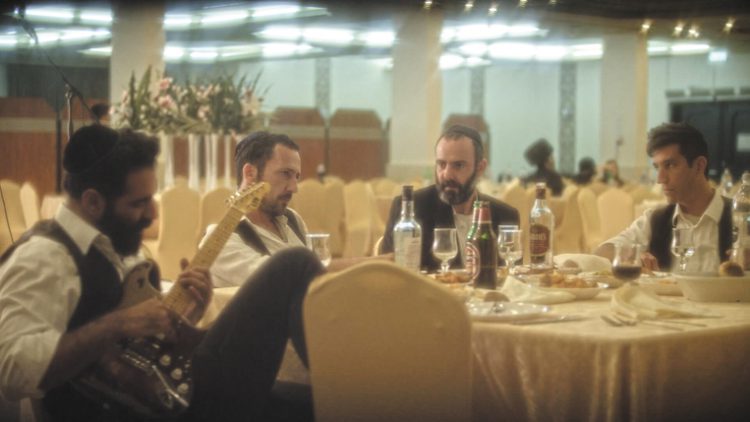Redemption between rock (‘n’ roll) and a hard place

By Michael Fox, Special To The Dayton Jewish Observer
It’s easy to imagine a Hollywood remake of Redemption, an unexpected Israeli drama about a forty-something widower who reunites his old rock band to pay for his daughter’s cancer treatments.
It writes itself. A buddy comedy in which the guys dredge up old grudges, rediscover their affection for each other, confront commitment and mortality and are saved by rock ‘n’ roll one more time from lives of quiet desperation.
But that’s not this movie. Yossi Madmoni and Boaz Yehonatan Yaacov’s Redemption is, at its core, a study of a midlife crisis. Hanging on by a thread, Menachem (or Menny, as his bandmates call him) reaches into his past for help. But how often does the road back lead to a path to the future?
The JCC Film Fest will present a matinee screening of Redemption in partnership with Hadassah, June 13.
Redemption is smart and compelling, and determined to earn every iota of any feel-good resolution. Its pleasures include a batch of excellent songs that leaven the erstwhile hero’s existential journey.
But Menny is often taciturn or flat-out opaque (as are the movie’s female characters, who remain underdeveloped). He’s a complicated character, and the filmmakers expect you to grapple with him during as well as after the movie.
Menny (Moshe Folkenflik) is a stoic, unassuming man who works in a grocery store and became religious around 15 years ago. He’s an unmarried shlub devoted completely to his lone child.
When his daughter Geula (Emily Granin) slips off her wig to reveal her shaved head, we realize that she’s ill. In a brilliant bit of parallel visual storytelling, the next shot is of Menny donning a cap over his yarmulke. Father and daughter both have secrets that only certain people are allowed to know.
Much later, we realize that the film’s central theme and conflict — the difficulty of wearing two hats, secular and religious — was expressed literally in that single, fleeting image of Menny.
 For now, though, he simply wants to look inconspicuous when he meets his former guitarist, Avi, in a nightclub.
For now, though, he simply wants to look inconspicuous when he meets his former guitarist, Avi, in a nightclub.
Partly out of past friendship and partly out of guilt, Menny’s former cohorts agree to reunite and start playing Chasidic weddings.
It’s clear from the first gig that they enjoy playing together, and their motivations gradually move beyond either obligation or money.
High Beams, as the band is called, cheerfully plays its old hits to revelers who don’t know or care that Menny stopped writing years ago.
Menny is a commanding vocalist and an intense performer, and the excitement of making people dance is a lot more fun than punching a clock.
But his enjoyment is mitigated by the pressure of his day job, Geula’s treatment schedule, and the enigmatic babysitter who lives upstairs.
Above all, Menny is fearful of losing whatever he has established — a moral toehold or self-protective distance — via religious practice.
But something’s got to give, because he’s plainly unhappy. It’s hard to say what he grieves more: the wife he lost to cancer or the emptiness where there should be meaning (and which he was seeking 15 years ago).
Like its protagonist, Redemption leaves a lot unsaid that we have to interpret. For example, Menny makes his secular bandmates wear tzitzit under their shirts to pretend that they are Chasidim.
This act of calculated deceit by an observant man is never questioned, presumably because Menny’s share of the earnings is going to (hopefully) cure Geula.
The road to redemption often requires a breakdown and a breakthrough, and Redemption conforms to that expectation. It’s helpful to know that the Hebrew word for redemption is geula.
The JCC Film Fest in partnership with Hadassah presents Redemption at 10 a.m. Thursday, June 13 at The Neon, 130 E. Fifth St., Dayton. Clinical Psychologist Dr. Judith Schwartzman will lead a discussion following the movie. Tickets are available at the door, at jewishdayton.org, at the Boonshoft CJCE, 525 Versailles Dr., Centerville, or by calling Karen Steiger at 610-1555.
To read the complete June 2019 Dayton Jewish Observer, click here.

